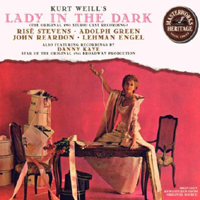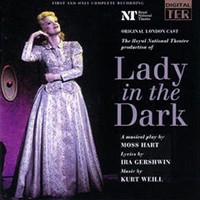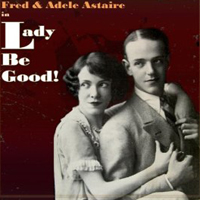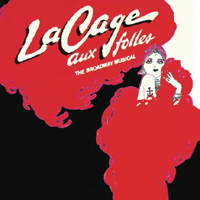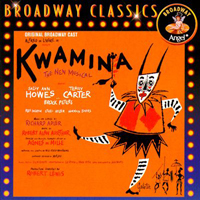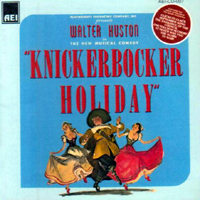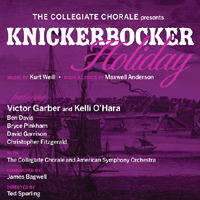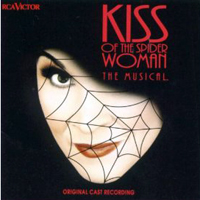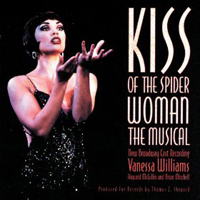 Original Broadway Cast, 1948 (Columbia/Sony)
Original Broadway Cast, 1948 (Columbia/Sony)  (5 / 5) Here is Cole Porter’s greatest score — fresh, groundbreaking, and oh, so naughty. The show’s book, by Bella and Sam Spewack, has a rousing backstage plot matched by a spirited play-within-the-play: Shakespeare’s The Taming of the Shrew, which turns up in excerpts here and there, giving the principals dual roles. As Fred/Petruchio and Lilli/Kate, the great stars Alfred Drake and Patricia Morison are at their professional peak on the cast album; they deliver every word distinctly, and caress every note. As Lois/Bianca, Lisa Kirk acts and sings her numbers impeccably; her performance of “Why Can’t You Behave?” is unsurpassed as her sultry voice pours over great lines such as, “There I’ll care for you forever / Well, at least till you dig my grave.” Porter’s raunchy lyrics for “Always True to You in My Fashion” are also meticulously rendered by Kirk. Harold Lang is on hand as Bill/Lucentio to sing the silly but charming “Bianca.” Pembroke Davenport conducts skillfully. Kiss Me, Kate contains several songs that have become famous: “So in Love,” “Wunderbar” “Another Op’nin’, Another Show,” “Too Darn Hot,” and one of the cleverest comedy numbers ever written for the stage, “Brush Up Your Shakespeare.” And let’s not forget the delightfully nasty “I Hate Men,” performed here by Patricia Morison as if she really means it. [Note: Kiss Me, Kate opened on December 30, 1948, but the cast recording was actually made in January 1949.] — Gerard Alessandrini
(5 / 5) Here is Cole Porter’s greatest score — fresh, groundbreaking, and oh, so naughty. The show’s book, by Bella and Sam Spewack, has a rousing backstage plot matched by a spirited play-within-the-play: Shakespeare’s The Taming of the Shrew, which turns up in excerpts here and there, giving the principals dual roles. As Fred/Petruchio and Lilli/Kate, the great stars Alfred Drake and Patricia Morison are at their professional peak on the cast album; they deliver every word distinctly, and caress every note. As Lois/Bianca, Lisa Kirk acts and sings her numbers impeccably; her performance of “Why Can’t You Behave?” is unsurpassed as her sultry voice pours over great lines such as, “There I’ll care for you forever / Well, at least till you dig my grave.” Porter’s raunchy lyrics for “Always True to You in My Fashion” are also meticulously rendered by Kirk. Harold Lang is on hand as Bill/Lucentio to sing the silly but charming “Bianca.” Pembroke Davenport conducts skillfully. Kiss Me, Kate contains several songs that have become famous: “So in Love,” “Wunderbar” “Another Op’nin’, Another Show,” “Too Darn Hot,” and one of the cleverest comedy numbers ever written for the stage, “Brush Up Your Shakespeare.” And let’s not forget the delightfully nasty “I Hate Men,” performed here by Patricia Morison as if she really means it. [Note: Kiss Me, Kate opened on December 30, 1948, but the cast recording was actually made in January 1949.] — Gerard Alessandrini
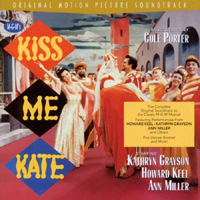 Film Soundtrack, 1953 (MGM/Rhino-Turner)
Film Soundtrack, 1953 (MGM/Rhino-Turner)  (5 / 5) MGM gave Kiss Me, Kate the royal treatment. The soundtrack is thrilling, even if this is more a flashy movie musical than a faithful transfer of the stage show. As Fred/Petruchio, Howard Keel sings with bravura. Katherine Grayson as Lilli/Kate is less satisfying; her vocal trills are pretty, but she doesn’t have the acting or belting chops for “I Hate Men.” The cast member who shines the brightest here is Ann Miller as Lois/Bianca. Besides being a great dancer, Miller was also a fine singer, and her brassy renditions of “Always True to You in My Fashion” and “Too Darn Hot” are terrific. Another delight is the musical scoring by Saul Chaplin and André Previn. Although the treatment is as Hollywoodish as can be, Porter’s splendid melodies and urbane lyrics shine through. The stage score was transferred to the screen almost in its entirety; “Another Op’nin’, Another Show” and “Bianca” were dropped (parts of both are still heard as background music), but another great Porter song was added, “From This Moment On.” That track alone is worth the price of the soundtrack recording, but Rhino’s expanded CD includes the entire film score in glorious early stereo. — G.A.
(5 / 5) MGM gave Kiss Me, Kate the royal treatment. The soundtrack is thrilling, even if this is more a flashy movie musical than a faithful transfer of the stage show. As Fred/Petruchio, Howard Keel sings with bravura. Katherine Grayson as Lilli/Kate is less satisfying; her vocal trills are pretty, but she doesn’t have the acting or belting chops for “I Hate Men.” The cast member who shines the brightest here is Ann Miller as Lois/Bianca. Besides being a great dancer, Miller was also a fine singer, and her brassy renditions of “Always True to You in My Fashion” and “Too Darn Hot” are terrific. Another delight is the musical scoring by Saul Chaplin and André Previn. Although the treatment is as Hollywoodish as can be, Porter’s splendid melodies and urbane lyrics shine through. The stage score was transferred to the screen almost in its entirety; “Another Op’nin’, Another Show” and “Bianca” were dropped (parts of both are still heard as background music), but another great Porter song was added, “From This Moment On.” That track alone is worth the price of the soundtrack recording, but Rhino’s expanded CD includes the entire film score in glorious early stereo. — G.A.
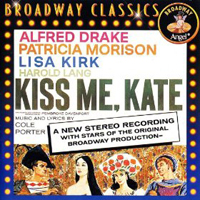 Studio Cast, 1959 (Capitol/Angel)
Studio Cast, 1959 (Capitol/Angel)  (5 / 5) In many ways, this recording is nearly identical to the original cast album made 10 years earlier, the only major difference being that this version is in stereo. The stars of Kiss Me, Kate reunited to re-record the score in state-of-the-art, “Full Dimensional Stereo” soon after the airing of a CBS-TV version of the musical that starred Alfred Drake and Patricia Morison. The telecast featured Bill Hayes as Bill! Lucentio and Julie Wilson as Lois/Bianca, but this studio cast recording brought back Lisa Kirk and Harold Lang, along with the Broadway conductor, Pembroke Davenport. All of the performances are as fresh and vibrant as on the original album; except for the improved sound quality, it’s sometimes hard to tell one version from the other. But the orchestra seems augmented a bit here, and original cast member Lorenzo Fuller as Paul the valet gets to lead “Another Op’nin’, Another Show” in addition to “Too Darn Hot.” P.S.: The show’s gangster roles are sung by Aloysius Donovan and Alexis Dubroff, both a.k.a. Alfred Drake! — G.A.
(5 / 5) In many ways, this recording is nearly identical to the original cast album made 10 years earlier, the only major difference being that this version is in stereo. The stars of Kiss Me, Kate reunited to re-record the score in state-of-the-art, “Full Dimensional Stereo” soon after the airing of a CBS-TV version of the musical that starred Alfred Drake and Patricia Morison. The telecast featured Bill Hayes as Bill! Lucentio and Julie Wilson as Lois/Bianca, but this studio cast recording brought back Lisa Kirk and Harold Lang, along with the Broadway conductor, Pembroke Davenport. All of the performances are as fresh and vibrant as on the original album; except for the improved sound quality, it’s sometimes hard to tell one version from the other. But the orchestra seems augmented a bit here, and original cast member Lorenzo Fuller as Paul the valet gets to lead “Another Op’nin’, Another Show” in addition to “Too Darn Hot.” P.S.: The show’s gangster roles are sung by Aloysius Donovan and Alexis Dubroff, both a.k.a. Alfred Drake! — G.A.
 Television Cast, 1968 (Columbia Special Products/Sony)
Television Cast, 1968 (Columbia Special Products/Sony)  (2 / 5) As is also true of the television cast recording of Brigadoon starring Robert Goulet, the arrangements, orchestrations, and keys of the songs as presented here make this item sound more like a pop record than a Kiss Me, Kate cast album. That’s most unfortunate in two cuts, “I Hate Men” and “Always True to You In My Fashion,” both given “swinging ’60s” arrangements. But again, the leads — here, Goulet as Fred/Petruchio and his then-wife, Carol Lawrence, as Lili/Kate — were Broadway musical theater stars of their day. It’s nice to hear their voices in these roles, but would have been even nicer if Cole Porter’s great score had been given a more traditional reading. Also on hand is Michael Callan, who played Riff in the OBC of West Side Story, as Bill/Lucentio; the one stinker song in the score, “Bianca,” is nowhere to be heard here, but Callan has been compensated with “Too Darn Hot,” not originally Bill’s number. Jessica Walter does a fine job with Lois/Bianca’s musical moments (even “Always True to You in My Fashion,” despite that tacky rearrangement), and Jules Munshin and Marty Ingels are amusing as the gangsters in “Brush Up Your Shakespeare.” Sharp-eared listeners will note that a few of Porter’s lyrics for some of these songs were rewritten for this TV adaptation, for whatever reason. {Note: Sony’s CD edition of the recording is packaged on a single disc with the 1966 Brigadoon TV cast album referenced above.] — Michael Portantiere
(2 / 5) As is also true of the television cast recording of Brigadoon starring Robert Goulet, the arrangements, orchestrations, and keys of the songs as presented here make this item sound more like a pop record than a Kiss Me, Kate cast album. That’s most unfortunate in two cuts, “I Hate Men” and “Always True to You In My Fashion,” both given “swinging ’60s” arrangements. But again, the leads — here, Goulet as Fred/Petruchio and his then-wife, Carol Lawrence, as Lili/Kate — were Broadway musical theater stars of their day. It’s nice to hear their voices in these roles, but would have been even nicer if Cole Porter’s great score had been given a more traditional reading. Also on hand is Michael Callan, who played Riff in the OBC of West Side Story, as Bill/Lucentio; the one stinker song in the score, “Bianca,” is nowhere to be heard here, but Callan has been compensated with “Too Darn Hot,” not originally Bill’s number. Jessica Walter does a fine job with Lois/Bianca’s musical moments (even “Always True to You in My Fashion,” despite that tacky rearrangement), and Jules Munshin and Marty Ingels are amusing as the gangsters in “Brush Up Your Shakespeare.” Sharp-eared listeners will note that a few of Porter’s lyrics for some of these songs were rewritten for this TV adaptation, for whatever reason. {Note: Sony’s CD edition of the recording is packaged on a single disc with the 1966 Brigadoon TV cast album referenced above.] — Michael Portantiere
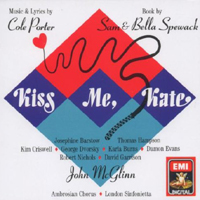 Studio Cast, 1990 (Angel)
Studio Cast, 1990 (Angel)  (3 / 5) Conductor John McGlinn spearheaded this recording of Kiss Me, Kate, starring Josephine Barstow and Thomas Hampson in an edition that’s less effective than other recorded performances of this great show. Still, it was an important aural document when it appeared in 1990, because of its completeness. In addition to the original overture, the album offers every verse of every song and fully orchestrated versions of songs dropped from the show before it opened, plus an excellent booklet filled with background information. Hampson and Barstow are magnificent opera singers, but a Cole Porter score needs performers with a more theatrical edge. Kim Criswell is also a wonderful talent, but is miscast as Lois/Bianca. George Dvorsky, David Garrison, and Davis Gaines are effective in their roles. On the whole, this recording sounds somewhat cold, and it ultimately short changes the jazzier, wittier aspects of the score. — G.A.
(3 / 5) Conductor John McGlinn spearheaded this recording of Kiss Me, Kate, starring Josephine Barstow and Thomas Hampson in an edition that’s less effective than other recorded performances of this great show. Still, it was an important aural document when it appeared in 1990, because of its completeness. In addition to the original overture, the album offers every verse of every song and fully orchestrated versions of songs dropped from the show before it opened, plus an excellent booklet filled with background information. Hampson and Barstow are magnificent opera singers, but a Cole Porter score needs performers with a more theatrical edge. Kim Criswell is also a wonderful talent, but is miscast as Lois/Bianca. George Dvorsky, David Garrison, and Davis Gaines are effective in their roles. On the whole, this recording sounds somewhat cold, and it ultimately short changes the jazzier, wittier aspects of the score. — G.A.
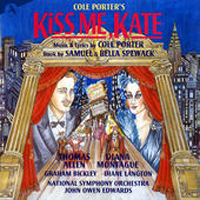 Studio Cast, 1996 (JAY, 2CDs)
Studio Cast, 1996 (JAY, 2CDs)  (4 / 5) Here’s another complete recording of the score. Thomas Allen and Diana Montague are well cast as Fred/Petruchio and Lilli/Kate, with beautiful voices that never overpower the songs and acting that suits the material nicely. Diane Langton as Lois/Bianca is somewhat less effective vocally and comically, but Graham Bickley as Bill!Lucentio is quite appealing. The score is excitingly conducted by john Owen Edwards; his tempi are bright and bouncy, and the orchestra sounds full and lush. The complete, original Robert Russell Bennett orchestrations are heard in all of the jazzy dance numbers, the overture, and the entr’acte, plus the scene-change music and underscoring. This two-disc set also contains bonus tracks of the overtures to Porter’s Can-Can, Jubilee, and Out of This World. — G.A.
(4 / 5) Here’s another complete recording of the score. Thomas Allen and Diana Montague are well cast as Fred/Petruchio and Lilli/Kate, with beautiful voices that never overpower the songs and acting that suits the material nicely. Diane Langton as Lois/Bianca is somewhat less effective vocally and comically, but Graham Bickley as Bill!Lucentio is quite appealing. The score is excitingly conducted by john Owen Edwards; his tempi are bright and bouncy, and the orchestra sounds full and lush. The complete, original Robert Russell Bennett orchestrations are heard in all of the jazzy dance numbers, the overture, and the entr’acte, plus the scene-change music and underscoring. This two-disc set also contains bonus tracks of the overtures to Porter’s Can-Can, Jubilee, and Out of This World. — G.A.
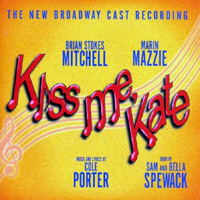 Broadway Cast, 2000 (DRG)
Broadway Cast, 2000 (DRG)  (4 / 5) The stellar performances of Brian Stokes Mitchell and Marin Mazzie help to make this a delightful cast album. Although the score was re-orchestrated for a smaller number of instruments, Cole Porter’s music still sounds great, and this Broadway revival proved that the story and songs hadn’t aged a bit. Mazzie’s rendition of Lilli’s “So in Love” is a particular standout as she captures all of the angst and passion inherent in one of Porter’s greatest love songs. Mitchell does an especially fine job with Fred’s/Petruchio’s numbers; his rendition of “Were Thine That Special Face” is at once poignant and thrilling. On the comedy side, Mazzie takes the honors with a wonderfully overwrought version of Kate’s “I Hate Men.” Amy Spanger and Michael Berresse are somewhat less effective as Lois/Bianca and Bill/Lucentio on this recording than they were onstage, but the entire cast, including Michael Mulheren and Lee Wilkof as the gangsters, performs with great vigor. If you’re looking for an excellent contemporary interpretation of this timeless show, look no further. — G.A.
(4 / 5) The stellar performances of Brian Stokes Mitchell and Marin Mazzie help to make this a delightful cast album. Although the score was re-orchestrated for a smaller number of instruments, Cole Porter’s music still sounds great, and this Broadway revival proved that the story and songs hadn’t aged a bit. Mazzie’s rendition of Lilli’s “So in Love” is a particular standout as she captures all of the angst and passion inherent in one of Porter’s greatest love songs. Mitchell does an especially fine job with Fred’s/Petruchio’s numbers; his rendition of “Were Thine That Special Face” is at once poignant and thrilling. On the comedy side, Mazzie takes the honors with a wonderfully overwrought version of Kate’s “I Hate Men.” Amy Spanger and Michael Berresse are somewhat less effective as Lois/Bianca and Bill/Lucentio on this recording than they were onstage, but the entire cast, including Michael Mulheren and Lee Wilkof as the gangsters, performs with great vigor. If you’re looking for an excellent contemporary interpretation of this timeless show, look no further. — G.A.
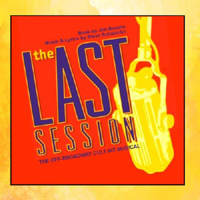 Original Off-Broadway Cast, 1997 (EMG)
Original Off-Broadway Cast, 1997 (EMG)  (4 / 5) By the mid 1980s, plays about AIDS began to surface and continued to emerge thereafter, but with only a few musicals among them. Nevertheless, this one would likely stand out in a large field. At the request of his partner, librettist Jim Brochu, composer-lyricist Steve Schalchlin wrote 10 songs about his (Schalchin’s) experiences battling the plague. Brochu slotted them into a script about Gideon, a dying rock musician who intends to commit suicide after recording a final album. Not surprisingly, the recording session — for which three other singers and an engineer are present — and its aftermath do not go entirely as planned. This storyline is rife with potential pitfalls, but Schalchlin avoids them all with his unflinching lyrics; examples are “Somebody’s Friend” (about cure rumors) and “The Group” (about support circles). The melodies are unflaggingly propulsive. Since AIDS is not in the news as much today as it was during its urgent-headline days, the musical is now something of a period piece, but there’s nothing dated about the performances heard on this recording. Bob Stillman has all of the passion needed for Gideon. The others, singing at the top of their lungs about their feelings, are Stephen Bienskie, Dean Bradshaw, Amy Coleman, and Grace Garland. Schalchlin did the arrangements, which were enhanced by Stillman, an expert pianist. — David Finkle
(4 / 5) By the mid 1980s, plays about AIDS began to surface and continued to emerge thereafter, but with only a few musicals among them. Nevertheless, this one would likely stand out in a large field. At the request of his partner, librettist Jim Brochu, composer-lyricist Steve Schalchlin wrote 10 songs about his (Schalchin’s) experiences battling the plague. Brochu slotted them into a script about Gideon, a dying rock musician who intends to commit suicide after recording a final album. Not surprisingly, the recording session — for which three other singers and an engineer are present — and its aftermath do not go entirely as planned. This storyline is rife with potential pitfalls, but Schalchlin avoids them all with his unflinching lyrics; examples are “Somebody’s Friend” (about cure rumors) and “The Group” (about support circles). The melodies are unflaggingly propulsive. Since AIDS is not in the news as much today as it was during its urgent-headline days, the musical is now something of a period piece, but there’s nothing dated about the performances heard on this recording. Bob Stillman has all of the passion needed for Gideon. The others, singing at the top of their lungs about their feelings, are Stephen Bienskie, Dean Bradshaw, Amy Coleman, and Grace Garland. Schalchlin did the arrangements, which were enhanced by Stillman, an expert pianist. — David Finkle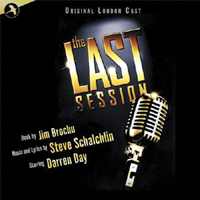 Original London Cast, 2012 (JAY)
Original London Cast, 2012 (JAY)  (4 / 5) When The Last Session premiered Off-Broadway, medicine was only just beginning to successfully cope with AIDS, removing its label as a death sentence and placing it more firmly in the chronic-illness category. This raises thoughts about how any present-day production of the show is perceived. For those encountering it for the first time, it might be viewed as a dark historical document; but for those who experienced it back in 1997, any new staging or recording is a stark reminder of what was once everyday reality. Those auditors may feel as if they’re reliving a too-painful past, and may well feel renewed fury mounting and tears welling up. Memories of friends and loved ones lost are not the sole reason for the fury and the tears; much of the credit for effect goes to Steve Schalchlin for the power and grace of his songs. Schalchlin writes brilliantly about Gideon and boyfriend Jack, Gideon’s parents, his AIDS support group. There’s not a song here — all of them written in a rock or folk-rock mode — that doesn’t break the heart. Perhaps the most crushing of all is “Somebody’s Friend,” which poignantly recounts the rumors of miracle cures that constantly circulated. The first-rate singers on this cast recording of a 2012 London production, directed by Guy Retallack and conducted by Tom Turner, are Darren Day as Gideon and Simone Craddock, with AJ Dean, Ron Emslie and Lucy Vandi as the others engaged in Gideon’s melancholy farewell recording. Call it strong medicine. — D.F.
(4 / 5) When The Last Session premiered Off-Broadway, medicine was only just beginning to successfully cope with AIDS, removing its label as a death sentence and placing it more firmly in the chronic-illness category. This raises thoughts about how any present-day production of the show is perceived. For those encountering it for the first time, it might be viewed as a dark historical document; but for those who experienced it back in 1997, any new staging or recording is a stark reminder of what was once everyday reality. Those auditors may feel as if they’re reliving a too-painful past, and may well feel renewed fury mounting and tears welling up. Memories of friends and loved ones lost are not the sole reason for the fury and the tears; much of the credit for effect goes to Steve Schalchlin for the power and grace of his songs. Schalchlin writes brilliantly about Gideon and boyfriend Jack, Gideon’s parents, his AIDS support group. There’s not a song here — all of them written in a rock or folk-rock mode — that doesn’t break the heart. Perhaps the most crushing of all is “Somebody’s Friend,” which poignantly recounts the rumors of miracle cures that constantly circulated. The first-rate singers on this cast recording of a 2012 London production, directed by Guy Retallack and conducted by Tom Turner, are Darren Day as Gideon and Simone Craddock, with AJ Dean, Ron Emslie and Lucy Vandi as the others engaged in Gideon’s melancholy farewell recording. Call it strong medicine. — D.F.

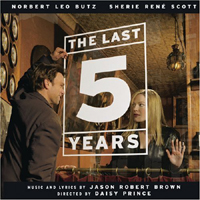
 (5 / 5) Although The Last 5 Years received mixed to negative reviews and closed quickly Off-Broadway in 2002, it has received many subsequent productions — in part because this is a two-character musical that requires minimal sets and costumes, but also because it has an excellent score by Jason Robert Brown, and it tells a compelling story with vivid characters. Somewhat autobiographical, the piece charts the five-year relationship between a writer (Jamie) and an actress (Cathy). It’s really more of a song cycle than a traditional musical, which certainly doesn’t mean that that it lacks emotion or theatricality. The highly creative and intriguing concept here is that, through Jamie’s songs, we see the couple’s relationship moving from beginning to end, while Cathy’s songs progressively take the story backward in time from the couple’s breakup to the first flush of romance. Both characters are fully rounded human beings with their own virtues and flaws: Jamie is smart, witty, and a real charmer, but also rather full of himself, while Cathy is warm, loving, and funny but tends to see herself as a victim. The forward/reverse concept adds immeasurably to the emotional content of the score: The exact moment when the couple’s stories overlap chronologically, in the scene of their engagement in a boat on a lake in Central Park, is breathtaking, and the final sequence is deeply moving. There’s also plenty of comic relief at hand: Cathy’s “A Summer in Ohio” is a hilarious vision of summer-stock hell, while “Shiksa Goddess” is Jamie’s very funny spiel about his mother’s anticipated reaction to his dating a non-Jew. Another highlight is “The Schmuel Song,” in which Jamie tells Cathy a sweetly humorous story that makes a point about their relationship. On this first recording of the score, Norbert Leo Butz and Sherie René Scott bring Jamie and Cathy to life in all their joy and pain, and the chamber-size orchestra — basically a string quartet, plus Brown as pianist-conductor — sounds beautiful. The Last 5 Years is a modern masterpiece of the American musical theater, and one or another recording of it is essential to the collection of anyone who loves the art form. — Michael Portantiere
(5 / 5) Although The Last 5 Years received mixed to negative reviews and closed quickly Off-Broadway in 2002, it has received many subsequent productions — in part because this is a two-character musical that requires minimal sets and costumes, but also because it has an excellent score by Jason Robert Brown, and it tells a compelling story with vivid characters. Somewhat autobiographical, the piece charts the five-year relationship between a writer (Jamie) and an actress (Cathy). It’s really more of a song cycle than a traditional musical, which certainly doesn’t mean that that it lacks emotion or theatricality. The highly creative and intriguing concept here is that, through Jamie’s songs, we see the couple’s relationship moving from beginning to end, while Cathy’s songs progressively take the story backward in time from the couple’s breakup to the first flush of romance. Both characters are fully rounded human beings with their own virtues and flaws: Jamie is smart, witty, and a real charmer, but also rather full of himself, while Cathy is warm, loving, and funny but tends to see herself as a victim. The forward/reverse concept adds immeasurably to the emotional content of the score: The exact moment when the couple’s stories overlap chronologically, in the scene of their engagement in a boat on a lake in Central Park, is breathtaking, and the final sequence is deeply moving. There’s also plenty of comic relief at hand: Cathy’s “A Summer in Ohio” is a hilarious vision of summer-stock hell, while “Shiksa Goddess” is Jamie’s very funny spiel about his mother’s anticipated reaction to his dating a non-Jew. Another highlight is “The Schmuel Song,” in which Jamie tells Cathy a sweetly humorous story that makes a point about their relationship. On this first recording of the score, Norbert Leo Butz and Sherie René Scott bring Jamie and Cathy to life in all their joy and pain, and the chamber-size orchestra — basically a string quartet, plus Brown as pianist-conductor — sounds beautiful. The Last 5 Years is a modern masterpiece of the American musical theater, and one or another recording of it is essential to the collection of anyone who loves the art form. — Michael Portantiere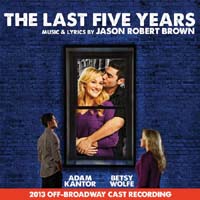
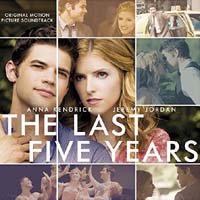
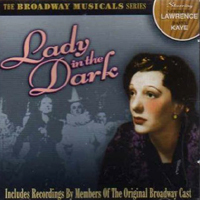
 (3 / 5) Gertrude Lawrence had a reputation as a poor singer; Kurt Weill was quoted as saying that she had “the greatest range between C and C-sharp.” Perhaps she was inconsistent in live performances, but as heard in her studio recordings of songs from Lady in the Dark, Lawrence is in command and on pitch most of the time. (There are a few questionable notes in “My Ship” and elsewhere.) With music by Well and lyrics by Ira Gershwin, all of the songs in this show, save one, appear in dreams that fashion magazine editor Liza Elliott (Lawrence) recounts to her analyst. Each dream becomes a mini-operetta, but these first recordings from the score feature only its major numbers; the exception is a medley from the “Glamour Dream” that includes “Oh, Fabulous One,” “Huxley,” and “Girl of the Moment.” (It’s fun to hear Lawrence handle the patter of “Huxley” with a vocal quartet culled from the show’s chorus; this gives us some sense of the original production.) The “Glamour Dream” continues with Lawrence blithely swinging through “One Life to Live,” then the “Wedding Dream” presents the star in a romantic ballad, “This Is New,” and a fairy tale, “The Princess of Pure Delight.” Kaye, who played Russell Paxton/The Ringmaster in the show, delivers “It’s Never Too Late to Mendelssohn” and his big showstopper, “Tschaikowsky (and Other Russians),” in which he races through the names of 50 Russian composers in a tongue-twisting tour de force. Lawrence then scores with another showstopper, “The Saga of ]enny. ” (Unfortunately, for this recording, Ira Gershwin had to sanitize some of his ribald lyrics for that song; another disappointment is that the arrangements and orchestrations on all of these recordings are watered-down versions of what composer Weill wrote. ) The show’s final number, “My Ship,” is the only one sung outside of the dream sequences, and it marks the conclusion of Liza’s therapy; she recalls the words to the song from her childhood, and is instantly cured! While these vintage recordings do not really convey the theatricality of Lady in the Dark, they are a valuable record of a show that holds a major place in the development of the modern musical. Note that this compilation has bonus tracks including separate recordings of songs from the score by Danny Kaye, as well as the incomparable Hildegarde singing “The Saga of Jenny.” — Jeffrey Dunn
(3 / 5) Gertrude Lawrence had a reputation as a poor singer; Kurt Weill was quoted as saying that she had “the greatest range between C and C-sharp.” Perhaps she was inconsistent in live performances, but as heard in her studio recordings of songs from Lady in the Dark, Lawrence is in command and on pitch most of the time. (There are a few questionable notes in “My Ship” and elsewhere.) With music by Well and lyrics by Ira Gershwin, all of the songs in this show, save one, appear in dreams that fashion magazine editor Liza Elliott (Lawrence) recounts to her analyst. Each dream becomes a mini-operetta, but these first recordings from the score feature only its major numbers; the exception is a medley from the “Glamour Dream” that includes “Oh, Fabulous One,” “Huxley,” and “Girl of the Moment.” (It’s fun to hear Lawrence handle the patter of “Huxley” with a vocal quartet culled from the show’s chorus; this gives us some sense of the original production.) The “Glamour Dream” continues with Lawrence blithely swinging through “One Life to Live,” then the “Wedding Dream” presents the star in a romantic ballad, “This Is New,” and a fairy tale, “The Princess of Pure Delight.” Kaye, who played Russell Paxton/The Ringmaster in the show, delivers “It’s Never Too Late to Mendelssohn” and his big showstopper, “Tschaikowsky (and Other Russians),” in which he races through the names of 50 Russian composers in a tongue-twisting tour de force. Lawrence then scores with another showstopper, “The Saga of ]enny. ” (Unfortunately, for this recording, Ira Gershwin had to sanitize some of his ribald lyrics for that song; another disappointment is that the arrangements and orchestrations on all of these recordings are watered-down versions of what composer Weill wrote. ) The show’s final number, “My Ship,” is the only one sung outside of the dream sequences, and it marks the conclusion of Liza’s therapy; she recalls the words to the song from her childhood, and is instantly cured! While these vintage recordings do not really convey the theatricality of Lady in the Dark, they are a valuable record of a show that holds a major place in the development of the modern musical. Note that this compilation has bonus tracks including separate recordings of songs from the score by Danny Kaye, as well as the incomparable Hildegarde singing “The Saga of Jenny.” — Jeffrey Dunn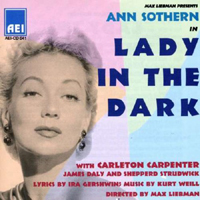
 (1 / 5) Taken directly from the soundtrack of a kinescope of a Max Liebman television production, this Lady in the Dark stars Ann Sothern as Liza. The orchestrations are by Irwin Kostal, and they bear little resemblance to Weill’s originals; the musical style is more 1950s Hollywood than 1940s Broadway. Sothern handles her dialogue well, and has the right glamour and archness for the role. Her “One Life to Live” is jaunty and cool, her “My Ship” is smooth if not overly complex, but her “Saga of Jenny” is incomplete and cleaned up for TV. The recording includes three long, extraneous dances to variations on Weill’s music; they were performed in the 90-minute TV special by Bambi Linn and Rod Alexander. These annoying entries aside, the bonus tracks on this CD make it worth purchasing. Among them are Lawrence’s studio recordings of several songs from the score, plus her live broadcast performances of “Jenny” and “My Ship” with MacDonald Carey of the original Broadway cast. — J.D.
(1 / 5) Taken directly from the soundtrack of a kinescope of a Max Liebman television production, this Lady in the Dark stars Ann Sothern as Liza. The orchestrations are by Irwin Kostal, and they bear little resemblance to Weill’s originals; the musical style is more 1950s Hollywood than 1940s Broadway. Sothern handles her dialogue well, and has the right glamour and archness for the role. Her “One Life to Live” is jaunty and cool, her “My Ship” is smooth if not overly complex, but her “Saga of Jenny” is incomplete and cleaned up for TV. The recording includes three long, extraneous dances to variations on Weill’s music; they were performed in the 90-minute TV special by Bambi Linn and Rod Alexander. These annoying entries aside, the bonus tracks on this CD make it worth purchasing. Among them are Lawrence’s studio recordings of several songs from the score, plus her live broadcast performances of “Jenny” and “My Ship” with MacDonald Carey of the original Broadway cast. — J.D.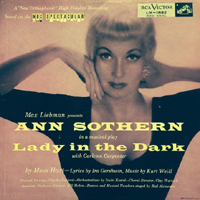
 (2 / 5) Before Lady in the Dark was performed live on television in 1954, the cast went into a studio and made this album. Irwin Kostal’s orchestrations sound much better here, without all the background noise and hubbub of the AEI release reviewed above. Ann Sothern comes across well, while Carleton Carpenter does a fine job as Beekman in the “Glamour Dream” and does not disappoint with the Ringmaster’s “Tschaikowsky.” Robert Fortier gets to sing a little as Randy Culver, the character’s name having been inexplicably changed from Randy Curtis. — J.D.
(2 / 5) Before Lady in the Dark was performed live on television in 1954, the cast went into a studio and made this album. Irwin Kostal’s orchestrations sound much better here, without all the background noise and hubbub of the AEI release reviewed above. Ann Sothern comes across well, while Carleton Carpenter does a fine job as Beekman in the “Glamour Dream” and does not disappoint with the Ringmaster’s “Tschaikowsky.” Robert Fortier gets to sing a little as Randy Culver, the character’s name having been inexplicably changed from Randy Curtis. — J.D.